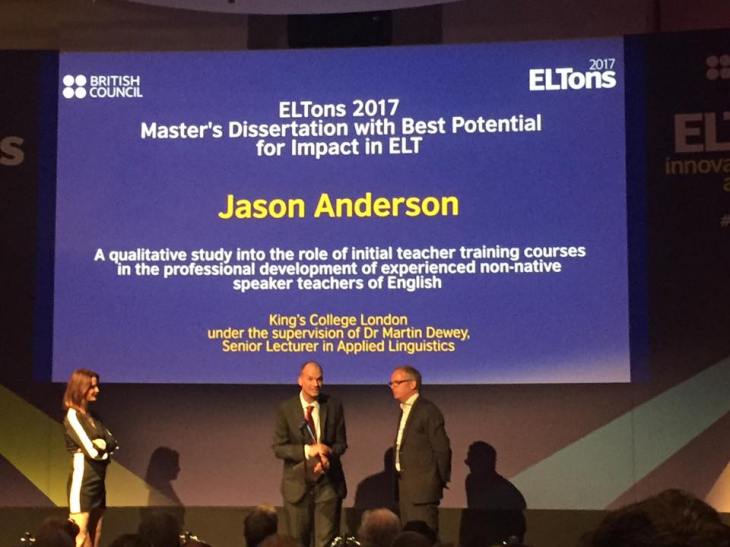 Taking on the live-blogging role for the British Council #ELTons Awards was quite a responsibility. I wanted to ensure that all the finalists got a mention, and that all the authors were credited for their work. I ended up writing over 4000 words. Indeed, I was so busy with that that I had almost forgotten that I was up for an award too!
Taking on the live-blogging role for the British Council #ELTons Awards was quite a responsibility. I wanted to ensure that all the finalists got a mention, and that all the authors were credited for their work. I ended up writing over 4000 words. Indeed, I was so busy with that that I had almost forgotten that I was up for an award too!
But up for an award I was. And when the other prizes had all been handed out, I began to feel my fingers getting numb (probably just exhaustion) as Mark Robson was introduced by Susie Dent, the host of the ceremony to talk about how the British Council supports research projects and recognises outstanding Master’s Dissertations. Suddenly I felt nervous. I’d told myself that it would be a real long shot to win two awards in two years (see last year here), but I found it difficult to type as the moment got closer.
Overwhelmed fingers
“And now for the winner…” Mark said, “…who we’ve actually got here on the pretext of another role this evening.” At that moment, I knew it was me, and my fingers froze on the keyboard. “We’re going to have to ask him to stop doing what he’s doing, because the award for the best Master’s Dissertation goes to our live blogger for this evening, Jason Anderson!”
Such an honour and a surprise. Interestingly, at this point, given how much I was overcome, I was hardly able to write at all. The blog reads, rather unrevealingly (I know that’s not a word) of my emotions inside:
| 20:24 |
| And the winner is: it’s me! |
Hmm. I should have made it a bit more memorable or creative, but the fact is, I probably couldn’t. As the music was playing, the audience were clapping, and my name appeared on the big screen, I had suddenly lost the ability to touch type… At least I kept the blog audience informed, performing my duties in the face of the ultimate distraction!
But seriously, many thanks to the judges, to the British Council and to the ELTons organising team who made me feel so welcome and supported in the role. Thanks also to the guys at Kings College who chose to put my work forward among many other great dissertations. It’s such an honour to think that of all the amazing dissertations put forward from top universities across the country, mine won!
Thanks to the research participants
Most of all, many thanks to the 19 participants in the research; all experienced, capable teachers who took a CELTA or CertTESOL course, and who also all happened to self-identify as non-native speakers of English. They had unique stories to tell with regard to their reasons for doing the course, what they got out of it and what challenges they faced afterwards. Unique, I say, but with some important common themes among their stories. Not surprisingly to readers of the TEFL Equity Advocates blog, perhaps the strongest theme running through the different narratives was one of discrimination and rejection as a result of their status as non-native speaker graduates of the CELTA. And what made this theme all the more important was that I have not explicitly planned to ask them about this, it emerged through the stories from multiple different directions, even being mentioned by some respondents who themselves didn’t face discrimination when talking about other members of their cohort. Another interesting and important finding, which is being further supported by research I’m currently carrying out with teachers from Egypt, is that the course does have an impact on their teaching towards more ‘communicative’ teaching practices, although this was not always reported as being appropriate given the diversity of contexts in which they found themselves teaching after the course.
One of the key aims of this research was to be able to offer useful suggestions to course providing organisations and also to Cambridge and Trinity in the hope that they may take on board the suggestions to make CertTESOL and CELTA courses more equitable and relevant for all participants. And I hope it has achieved this aim, and can report that Trinity College, London are already taking on board some of the findings, many of which came from the participants themselves.
If you would like to read the dissertation, it will soon be available on the British Council website here. But until it is, here’s a PDF copy hosted on my own website. Feedback and comments are always welcome!
And if you’re interested in the quantitative research that preceded this and was published in ELT Journal last year, click here to visit the publications page of my website. Scroll down to find a free click-through link to the paper on the Oxford University Press website. And here’s a blog and a video introduction summarising the findings of that research. Together, I hope they, along with this recent paper by Kiczkowiak et al., begin to shed light on an area of important research that hitherto had been almost completely neglected in the literature: the backgrounds, needs and challenges of the thousands of non-native speaker teachers taking short initial certification courses that were initially designed for native speakers.
Let’s hope that such courses become more inclusive of the needs of all participants in the future. Thanks to the support provided by this British Council ELTons award, there’s more chance that they will be!
Congratulations Jason!
LikeLike
Many thanks Adi.
LikeLike